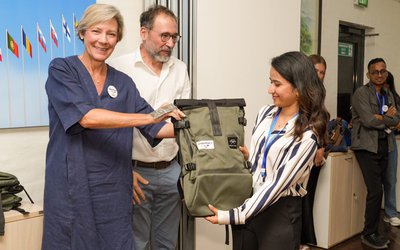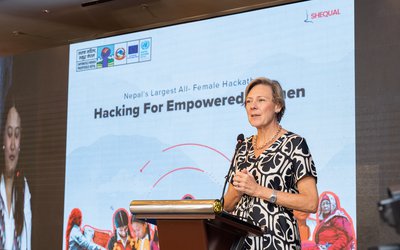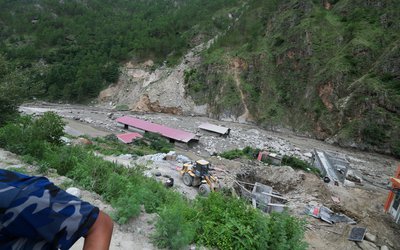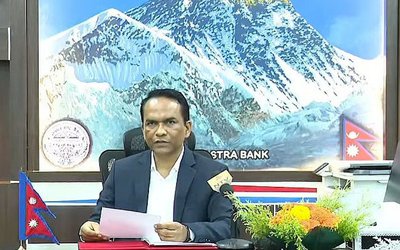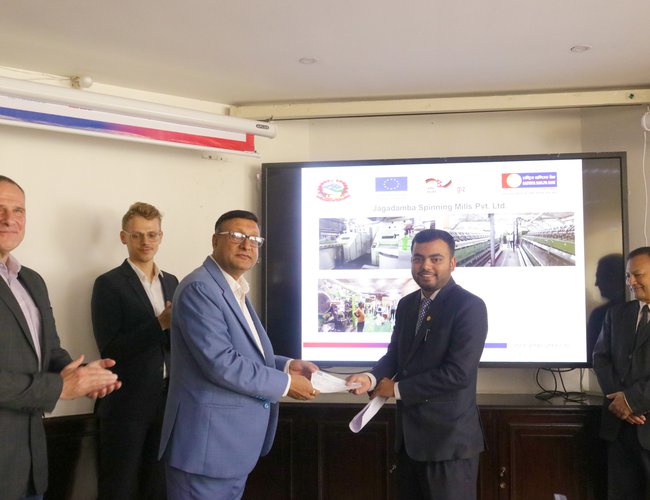
Rastriya Banijya Bank Limited (RBBL) has disbursed the first round of financial grants to energy-efficient industries in Nepal. The grants are aimed at promoting sustainable industrial practices and encouraging the adoption of energy-efficient technology.
Co-funded by the European Union, German Government, promoting energy efficient measures in the industries providing the grant support for installing the equipment one of the key objective of the Renewable Energy and Energy Efficiency Programme Green Recovery Empowerment with Energy in Nepal (REEEP-GREEN).
Implemented by the GIZ in close collaboration with the Ministry of Energy, Water Resources and Irrigation and the Alternative Energy Promotion Center (AEPC), RBBL is providing grant assistance to industries that have implemented energy efficiency technology to save power as a part of REEEP-GREEN Project.
The disbursement event was attended by key stakeholders including the Chief Executive Officer of RBBL, Senior Program Manager of the European Union, Deputy Head of Cooperation at the Embassy of the Federal Republic of Germany, Project Manager of the REEEP GREEN Project, and Deputy Chief Executive Officer of RBBL on July 17.
A total of 10 industries received grant support totaling around NPR 29 million after implementing energy-saving measures identified through energy audits. These efforts are expected to result in significant reductions in energy consumption, contributing to Nepal's climate action commitments and sustainable industrial growth.
The grant scheme managed by RBBL is part of the REEEP-GREEN project. This initiative aims to support industries with significant energy-saving potential in adopting efficient practices to promote green growth and improve livelihoods across the country. It provides partial grant coverage of total investment costs to encourage the implementation of energy audit recommendations by certified local auditors. The scheme focuses on energy efficiency, decent work practices, and environmental compliance.
This initial disbursement marks the official launch of the REEEP-GREEN grant facility, which will facilitate the broader adoption of cleaner and more efficient technologies in Nepal's industrial sector. This financing initiative aligns with national objectives to promote sustainable industrial practices by integrating circular economy principles, meeting environmental standards, and promoting decent work practices.
The benefits resulting from the grant-supported measures will serve as a proof of concept to develop business cases for loan and blended financing interventions in both the public and private sectors. This will encourage more industries and enterprises to implement energy efficiency measures and contribute to sustainable development in Nepal.
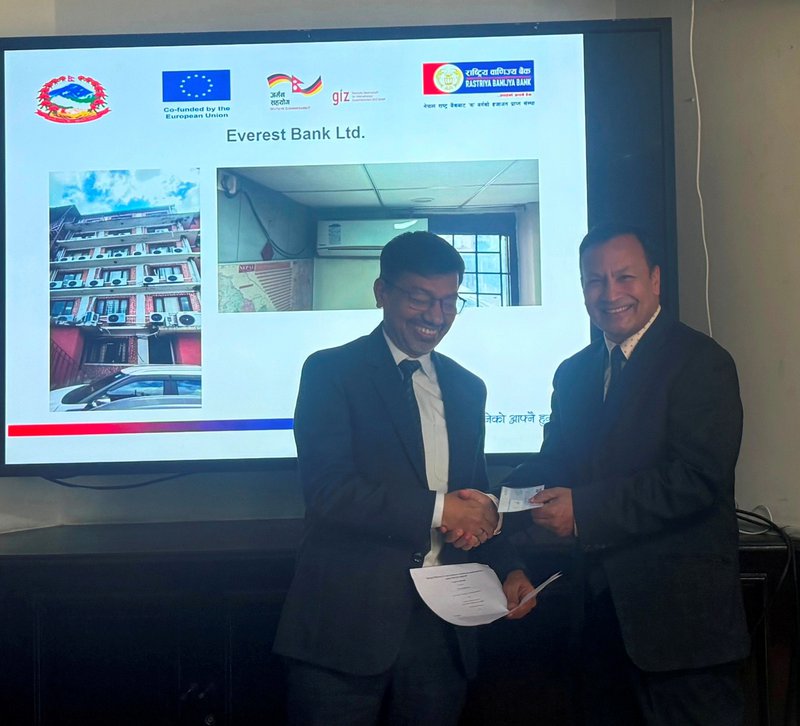
Caption: Ranzan Prakash Shrestha, Senior Program Manager of the European Delegation (Right) distributing cheque
Addressing the program, Ranzan Prakash Shrestha, Senior Program Manager of the European Delegation in Nepal, emphasized that the successful distribution of the initial round of grants to industries is not just about financial support, but also about investing in the future of local economies and promoting a more sustainable world in alignment with the EU's vision to separate economic growth from adverse environmental effects.
He commended Rastriya Banijya Bank Limited and the 10 industries for their innovative partnership, showcasing that green business practices and sustainability can coexist.
Shrestha expressed optimism that the positive outcomes of the first round of grant recipients will inspire other industries to embrace energy-efficient practices, leading to a collective effort to reduce energy consumption and emissions nationwide.
He highlighted that the effective implementation of energy-saving measures is anticipated to be a transformative initiative in reducing energy usage, cutting costs, enhancing competitiveness, and supporting climate action and sustainable industrial development.
During the event, Devendra Raman Khanal, Chief Executive Officer of RBBL, reiterated the bank's dedication to sustainable finance and fostering a green economy.
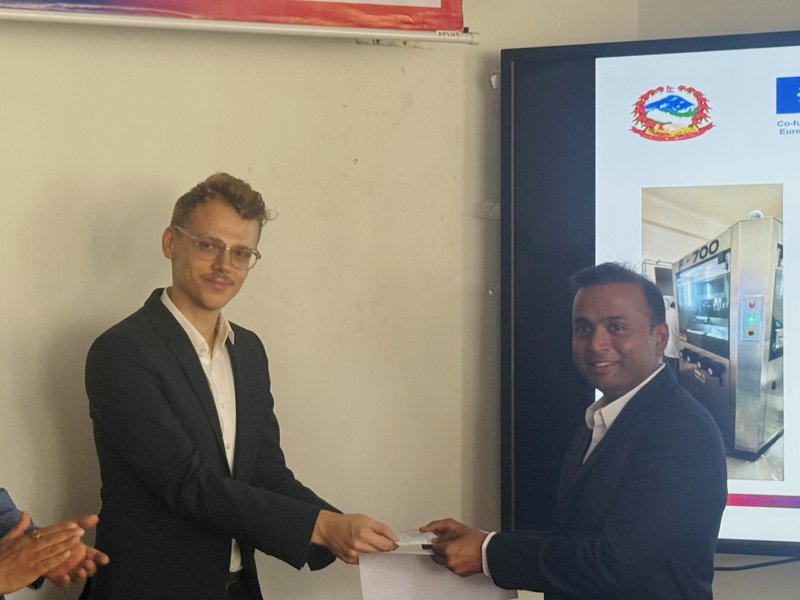
Caption: Jan Dirksen, Deputy Head of Cooperation at the Embassy of the Federal Republic of Germany (left) distributing cheque
Jan Dirksen, Deputy Head of Cooperation at the Embassy of the Federal Republic of Germany, emphasized that Germany has been a longstanding partner in Nepal's development. He highlighted the importance of energy-saving measures in reducing industrial production costs and saving energy. Dirksen also mentioned the German Government's continuous support for Nepal's clean and green energy sector.
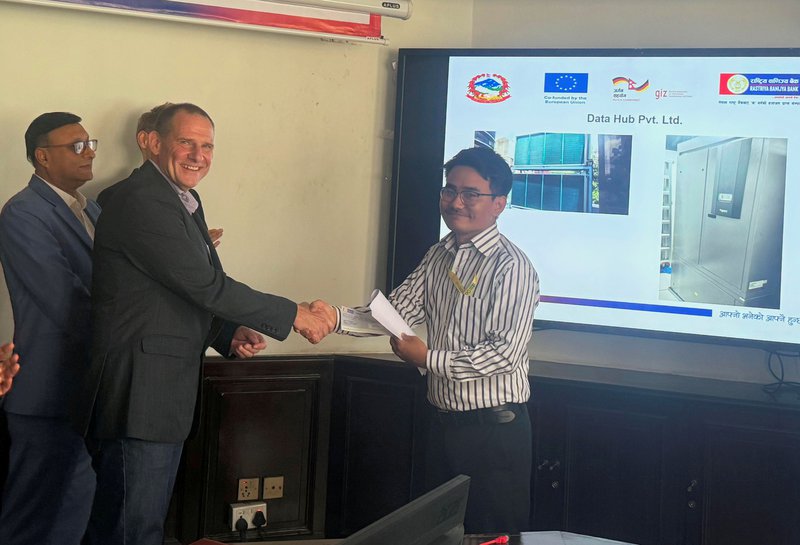
Caption: Dr. Frank Fecher, Project Manager of the REEEP GREEN Project (left) distributing grant)
Dr. Frank Fecher, Project Manager of the REEEP GREEN Project, stressed the significance of energy efficiency as a crucial tool for industries and enterprises to enhance competitiveness and reduce costs. The REEEP GREEN Project aims to promote energy efficiency for increased production with lower energy consumption.
Grant recipients Ashuthosh Sharma, Deputy CEO of Everest Bank, and Saiyam Mittal, Director of Curex Pharmaceuticals Pvt. Ltd., expressed their perspectives on the cost-saving benefits of implementing energy-efficient equipment.
"We were previously unaware of energy efficiency considerations. Through the project, we learned that replacing outdated machinery and enhancing certain processes can significantly decrease energy consumption. This has proven to be true for us," Mittal stated.
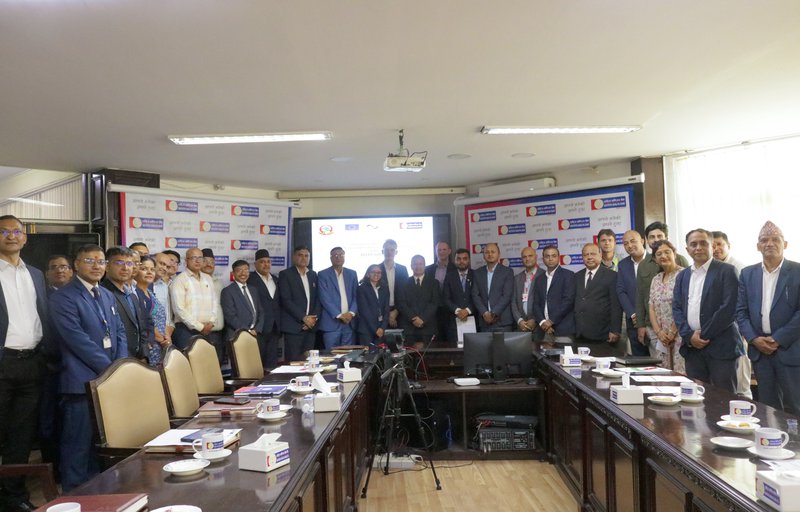
Caption: Group Photo
Rajib Mangal Joshi, Green Energy Finance Expert for the REEP-GREEN PROJECT at RBBL, conducted the event where Sarawaswati Adhikari, Deputy CEO of the bank, expressed the bank's privilege to be part of a significant project that focuses on energy efficiency and emission reduction.
The event was attended by Rudra Khanal, Director of the Alternative Energy Promotion Center, senior bank officials, representatives from industrialists and enterprises, GIZ Nepal officials, energy consultants, private sector associations, and industrialists.
- Dengue risk increases in Kathmandu
- Jul 18, 2025
- 33 Nepali Students Awarded Full Erasmus Mundus Scholarships for Master’s Studies in Europe
- Jul 18, 2025
- 93 Deaths, 22 Missing During Three Months of Water Induced Disaster
- Jul 18, 2025
- Weather Forecast: Partly Cloudy Across The Country Koshi, Bagmati, Gandaki and Karnali Provinces
- Jul 18, 2025
- Weather Forecast: Generally Cloudy Across The Country Light To Moderate Rainfall In Many Places Of Bagmati, Sudurpaschim, Karnali And Lumbini
- Jul 17, 2025
